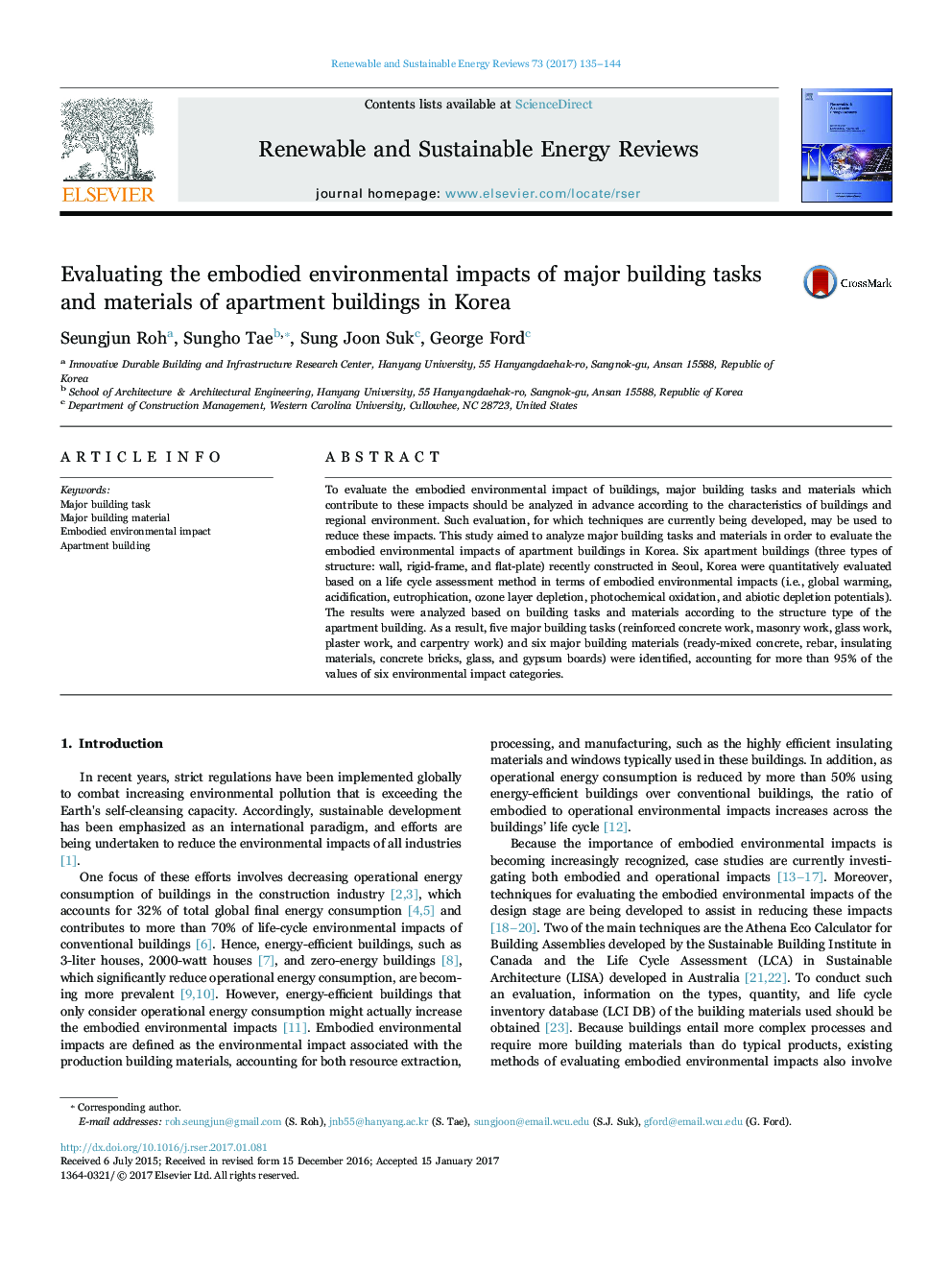| کد مقاله | کد نشریه | سال انتشار | مقاله انگلیسی | نسخه تمام متن |
|---|---|---|---|---|
| 5482252 | 1522313 | 2017 | 10 صفحه PDF | دانلود رایگان |
عنوان انگلیسی مقاله ISI
Evaluating the embodied environmental impacts of major building tasks and materials of apartment buildings in Korea
ترجمه فارسی عنوان
ارزیابی اثرات زیست محیطی تأثیرات وظایف عمده ساختمان و مواد ساختمان های آپارتمانی در کره
دانلود مقاله + سفارش ترجمه
دانلود مقاله ISI انگلیسی
رایگان برای ایرانیان
کلمات کلیدی
وظیفه اصلی ساختمان، مصالح ساختمانی عمده، تاثیر زیست محیطی ساختمان آپارتمانی،
ترجمه چکیده
برای ارزیابی تأثیر محیط زیستی ساختمانها، وظایف عمده ساختمان و مواد که به این تاثیرات کمک می کند باید با توجه به ویژگی های ساختمان ها و محیط منطقه ای، پیش از آن تحلیل شود. چنین ارزیابی، که در حال حاضر در حال توسعه است، می تواند برای کاهش این اثرات استفاده شود. این مطالعه با هدف بررسی وظایف ساختمانی و مواد اولیه برای ارزیابی اثرات زیست محیطی ساختمان های آپارتمانی در کره صورت گرفته است. شش ساختمان آپارتمانی (سه نوع ساختار: دیوار، قاب سفت و محکم و تخت) که اخیرا در سئول کره جنوبی ساخته شده اند، براساس روش ارزیابی چرخه عمر از نظر تاثیرات محیطی (یعنی گرم شدن کره زمین، اسیدی شدن، تخریب لایه اوزون، اکسیداسیون فتوشیمیایی و پتانسیل تخریب زیستی). نتایج بر اساس ساختار وظایف و مواد بر اساس ساختار نوع ساختمان آپارتمان مورد تجزیه و تحلیل قرار گرفت. در نتیجه، پنج وظیفه اصلی ساختمان (کارهای بتن مسلح، کارهای سنگ تراشی، کارهای شیشه ای، کار گچ و کار نجاری) و شش مصالح ساختمانی عمده (بتن آماده، میلگرد، مواد عایق، آجر بتنی، شیشه و گچ ) شناسایی شده اند، که بیش از 95 درصد ارزش های شش مقوله تاثیرات محیطی را شامل می شود.
موضوعات مرتبط
مهندسی و علوم پایه
مهندسی انرژی
انرژی های تجدید پذیر، توسعه پایدار و محیط زیست
چکیده انگلیسی
To evaluate the embodied environmental impact of buildings, major building tasks and materials which contribute to these impacts should be analyzed in advance according to the characteristics of buildings and regional environment. Such evaluation, for which techniques are currently being developed, may be used to reduce these impacts. This study aimed to analyze major building tasks and materials in order to evaluate the embodied environmental impacts of apartment buildings in Korea. Six apartment buildings (three types of structure: wall, rigid-frame, and flat-plate) recently constructed in Seoul, Korea were quantitatively evaluated based on a life cycle assessment method in terms of embodied environmental impacts (i.e., global warming, acidification, eutrophication, ozone layer depletion, photochemical oxidation, and abiotic depletion potentials). The results were analyzed based on building tasks and materials according to the structure type of the apartment building. As a result, five major building tasks (reinforced concrete work, masonry work, glass work, plaster work, and carpentry work) and six major building materials (ready-mixed concrete, rebar, insulating materials, concrete bricks, glass, and gypsum boards) were identified, accounting for more than 95% of the values of six environmental impact categories.
ناشر
Database: Elsevier - ScienceDirect (ساینس دایرکت)
Journal: Renewable and Sustainable Energy Reviews - Volume 73, June 2017, Pages 135-144
Journal: Renewable and Sustainable Energy Reviews - Volume 73, June 2017, Pages 135-144
نویسندگان
Seungjun Roh, Sungho Tae, Sung Joon Suk, George Ford,
